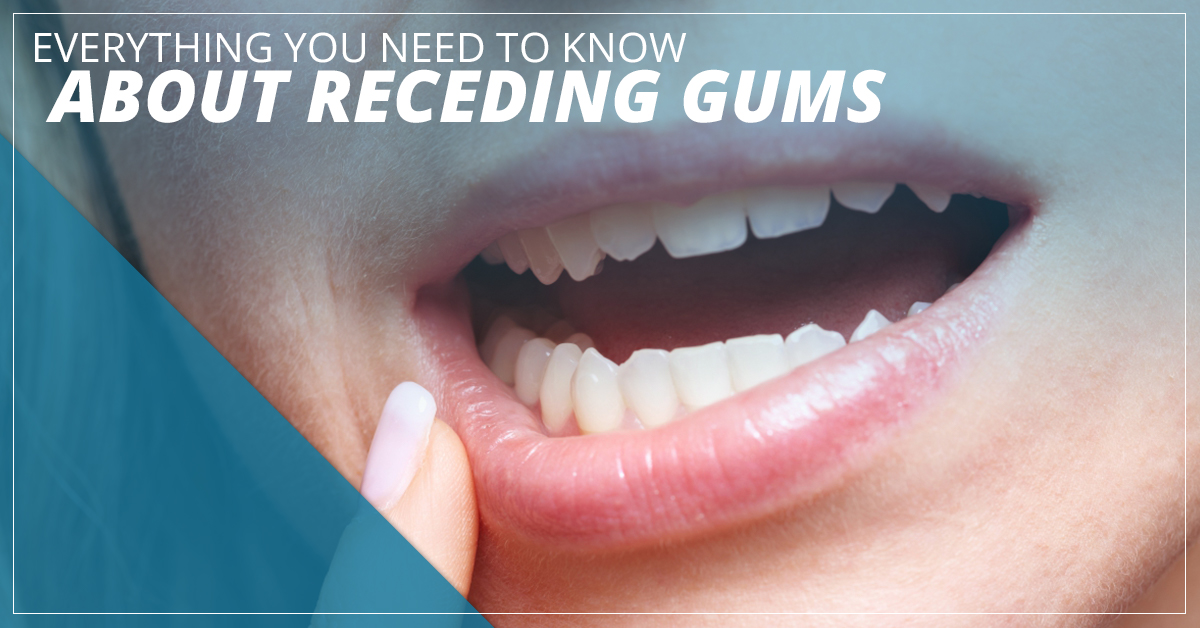
With so much information going around the internet these days and by word of mouth, it can often be difficult to tell what’s true and what isn’t. This is especially the case when it comes to health and wellness. In this blog, we hope to eliminate some of the misunderstandings surrounding receding gums. Specifically, what causes it, how it affects you, and how it can be prevented.
Gum Tissue
In order to understand what gum recession is, we first need to understand a little bit about gum tissue. Simply put, gum tissue is the layer of skin that covers bone tissue of the maxilla and the mandible (upper and lower jaw). Assuming the jaw bone is intact, the gum tissue will stay in place on the teeth. Essentially, the only reason for your gums moving away from the teeth is if the bone underneath begins to deteriorate. This process is called demineralization and can affect any part of the body causing diseases such as osteoporosis or tooth decay. In relation to gum recession, the question then becomes, “what causes bone to demineralize in the jaw?”
There are several major causes of bone demineralization so keep reading to learn more.
Causes Of Demineralization
There are four main causes of jawbone demineralization including periodontal disease, bruxism (grinding teeth), trauma, and genetics. Although we have jawbone around the entire circumference of our teeth, that doesn’t mean it’s all the same strength. The layer of bone around the outside of the teeth is actually much thinner than the bone tissue on the inside. This is an important piece of information to note when learning about what causes gum recession.
How It Happens
Now that you know what the main causes are of receding gums, we can take a look at what specifically causes these issues in the first place. As you can imagine, gum recession isn’t something that happens immediately or overnight, it’s a long process. However, that doesn’t mean that certain factors won’t affect the rate at which it happens. Bone is able to remineralize as long as the scaffold-like bone structure remains intact. Once it starts to fall apart, however, the less likely it is to support the tooth and will eventually lead to tooth loss. One important thing to note is that gums will not immediately recede after bone begins to demineralize. Instead, it remains in a fragile state where any small disturbance can cause it to recede. At this point, if you end up brushing carelessly or too vigorously, it could trigger the gum recession.
Causes Of Gum Recession
As we discussed earlier, gum recession only results when the bone underneath has demineralized. So, if you want to learn how to prevent gum recession or reverse it, you’ll need to know what is causing the demineralization. There are a number of things that could be causing this to happen.
Gum Disease
Unfortunately, gum disease is very common nowadays. The worst part about this is that many of the people who have it don’t even know it. According to the Journal of Dental Research, 47 percent of adults age 30 and over have periodontal disease. Periodontal disease is gum disease that has gotten bad enough to the point where it starts affecting the jawbone and other supporting structures of the teeth.
When bacteria begin to intrude and destroy bone tissue, it also causes a reaction in our immune system. When this happens, there is inflammation in the area that’s affected which can further increase the rate at which bone is lost.
Bruxism
Bruxism, or grinding of the teeth, is often a result of stress. However, it is also associated with sleep apnea and other sleeping disorders. Although our teeth need stimulation from chewing in order to promote bone growth in the jaw, grinding your teeth throughout the day will have the opposite effect and instead result in bone loss.
Trauma
It may seem like common sense to immediately see an oral health specialist after a physical injury to the face. However, many people think that if they if they don’t feel any loose teeth or saw no blood at the moment of the incident, there must be no problem. This couldn’t be further from the truth, as many of the tooth diseases caused by trauma go unnoticed until it’s too late.
Genetics
Similar to how we are all born with variations in hair color or texture, the thickness of our jawbones may also be determined by genetics. Although this may have no impact on us early in life, it could make someone more prone to bone loss later in life. Once that happens, your gums are at serious risk of receding.
Contact Pacific Northwest Periodontics
If you’re experiencing gum recession or a chipped or damaged tooth of any kind, you should speak with a periodontist at Pacific Northwest Periodontics immediately. If you’d like to learn more about gum recession, read part two of this blog series.








